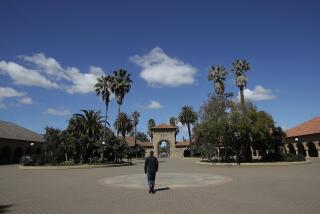Desegregation Called Peril to Black Colleges
- Share via
JACKSON, Miss. — When a black Mississippian named Jake Ayers sued the state over its dual system of higher education in 1975, all he wanted was for his children to be able to attend a historically black college and get an education equal to that available at white schools.
As his widow, Lillie Ayers, tells it, the suit brought results: “A day or two later, or it might have been the same day he filed the lawsuit, the governor announced that all black colleges would now be universities,” she said. “They did nothing else--just gave them that name and left them the way they were.”
And on Saturday, state and national civil rights leaders led a protest march of 15,000 people through the rain to the state Capitol. They contend that in the almost two decades since the lawsuit was filed, not much else has changed.
Mississippi’s three black public universities remain overwhelmingly black--just as the state’s five other universities are overwhelmingly white. The state’s policies and practices--from the allocation of funds to the quality of construction on black campuses to the creation and distribution of academic programs--all ensure that black people get inferior educations, critics of the system maintain.
After the U.S. Supreme Court in 1992 criticized the state’s failure to eliminate vestiges of segregation in its universities, Mississippi came up with a plan to address Ayers’ complaints. But many black Mississippians consider the proposed remedy worse than the problem it purported to correct: The state proposed to eliminate segregation by closing black universities.
In a plan that alarmed supporters of black colleges across the nation, Mississippi proposed closing one black school and merging another with a white university, in effect leaving the state with one black school.
Under a revised settlement plan that the black plaintiffs also rejected, one black school and one white school would be closed, and predominantly black Jackson State University would be given more money and enhanced.
The federal Justice Department, in supporting the plaintiffs, advanced an alternative proposal that many whites here consider equally outrageous: strengthening black colleges (and making them more attractive to whites) by moving prestigious programs away from white schools to black ones. Under this plan, no school would be closed.
The two widely divergent visions of the future of higher education will face off May 9 in a federal courtroom in Oxford, home of Ole Miss, the University of Mississippi, which was the desegregation battleground where James Meredith needed armed guards to enroll as the first black student in the 1960s.
“You kill our schools, you kill our communities,” said Benjamin F. Chavis Jr., executive director of the National Assn. for the Advancement of Colored People, which supports improving the black schools rather than closing them.
He and other civil rights leaders say they worry that a Mississippi precedent of closing schools could lead to the widespread elimination of black institutions that nurtured and developed African Americans during the decades when black people had no other means of securing a higher education.
“If we allow state-supported, historically black colleges and universities to be dismantled in Mississippi, it will set the stage for them to be dismantled in Alabama, Georgia, Tennessee, the Carolinas, Virginia and throughout the nation,” Chavis said at press conference before the march.
The alternative plan, involving switching academic programs from white schools to black schools, is strongly opposed by many whites, however, who see it as gutting the white institutions.
Speaking of the plan, which would switch the University of Mississippi’s medical school to Jackson State, Ole Miss Chancellor Gerald Turner told the Jackson Clarion-Ledger newspaper: “It would certainly strip the university of much of what it is nationally renowned for.” And questions remain about whether whites would attend mainly black institutions, even if academic programs were switched.
Blacks fighting for continued survival of the historically black schools contend that they are just asking for equal funding and treatment and are not championing a form of separate but equal education. White students always were welcomed at the black schools but chose not to attend, they say.
Even though blacks were the ones discriminated against, the state College Board’s proposal would “punish” black plaintiffs for bringing the lawsuit, said Aaron Henry, president emeritus of the Mississippi chapter of the NAACP and another speaker at the march.
Chavis said the impact of the Mississippi case might prove to be of greater importance to African Americans than was Brown vs. the Board of Education of Topeka, Kan., the landmark case that led to the desegregation of public schools.
Chavis and William F. Gibson, chairman of the NAACP’s board of directors, said all of the resources of the organization are behind black plaintiffs in the case.
About 3,000 college students from throughout the South were bused into Jackson for the protest march. They were joined by thousands of chanting, singing Mississippi residents in a three-mile walk from Jackson State to the Capitol.
The mostly black crowd stopped for a prayer outside the governor’s mansion before moving on for a rally on the grounds of the Capitol.
Marchers carried banners reading, “It’s about equity in education” and “Save H.B.C.U.” (historically black colleges and universities).
“They should not take away the only thing that we’ve got,” said Andre Smith, a student at Jackson State Learning Center who participated in the march. “Education is the most important thing to get us out of poverty and the conditions we are in.”
In the latest plan proposed by the College Board before negotiations broke down last month, the board proposed closing predominantly black Mississippi Valley State University, and also the predominantly white Mississippi University for Women, which would merge with another white school. The plan also would provide $20 million for Jackson State to acquire property and bolster its endowment. The state would also consider allowing Jackson State to operate a law school.
It is just one of a number of plans presented to U.S. District Judge Neal Biggers Jr., who ultimately will decide on a remedy.
The latest Justice Department plan would make Jackson State a dominant force in Mississippi education, giving it new schools of medicine, law and engineering.
When Jake Ayers, a civil rights activist who had helped desegregate public schools in the state, filed his lawsuit in 1975, he had grown disenchanted with integration, his widow said.
“We learned that being mixed with the white folk didn’t work,” said Lillie Ayers. When the public schools were desegregated, nearly all of the white students fled to private schools, she said. Suddenly, black students found themselves in schools with mostly white teachers, many of whom did not relate to the students as well as did the black teachers who had taught them under segregation.
Her husband’s goal was not further integration of the state’s colleges, but equity, she said.
Court documents show that the state’s three black collegess receive less per-pupil funding than white schools. Further, black and white schools duplicate many programs.
For example, three white universities opened centers in Jackson with curricula similar to Jackson State’s. The suit contends they were opened so white students in Jackson could attend college without having to attend a black university.
An example of fiscal inequity is also provided in court documents: In 1970, the state’s two land grant universities received $4.5 million in federal funds under one program. Mississippi State University, the predominantly white school, received $4.3 million while Alcorn State University, the black school, received $127,000, or 2.8%, of the funds. In addition, Alcorn did not receive funds under other federal programs that provided money to Mississippi State.
When the Supreme Court, in its first ruling to address desegregation in public colleges, sent the Ayers case back to a lower court in 1992, it said that it wasn’t enough for states merely to adopt race-neutral policies. It specifically named four areas that needed to be addressed: admissions policy, duplication of programs, the number of campuses needed in the state and the mission of each institution.
Chavis contended Saturday that remedies in each of those areas come down to equity in funding.
“It’s ironic to witness the dismantlement of apartheid in South Africa and here in the United States, in the Southland of Mississippi, it appears the state wants to erect a new form of apartheid,” he said.
“We didn’t tolerate it in South Africa, and we won’t tolerate it in Mississippi.”
More to Read
Sign up for Essential California
The most important California stories and recommendations in your inbox every morning.
You may occasionally receive promotional content from the Los Angeles Times.













